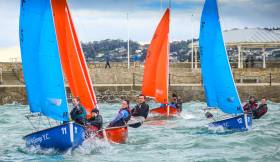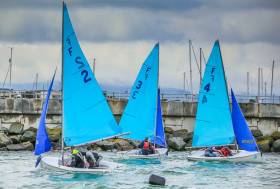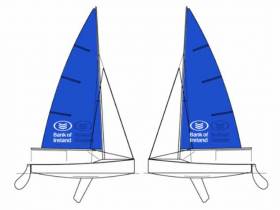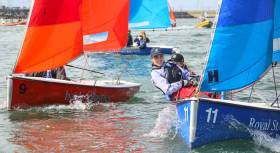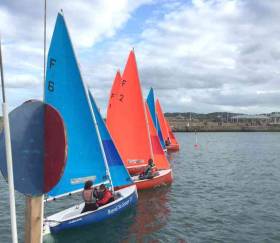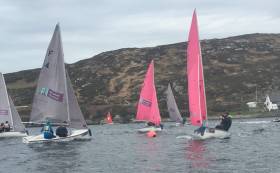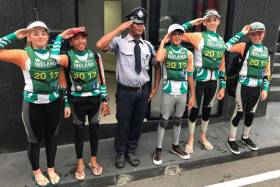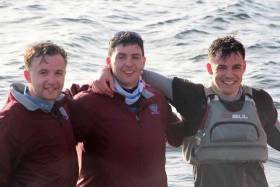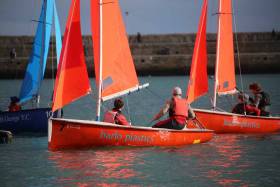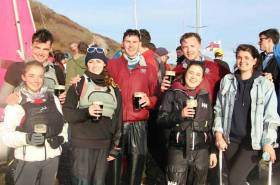Displaying items by tag: Team Racing
Blustery Start for New Dublin Team Racing League
The first round of the Dublin Team Racing League was sailed in blustery conditions yesterday in the relative shelter of Dun Laoghaire Harbour's Carlisle Pier where up to 76 short, sharp races were scheduled.
Dublin University Sailing Club hosted the first of the four League events with the goal to grow team racing in the Leinster region.
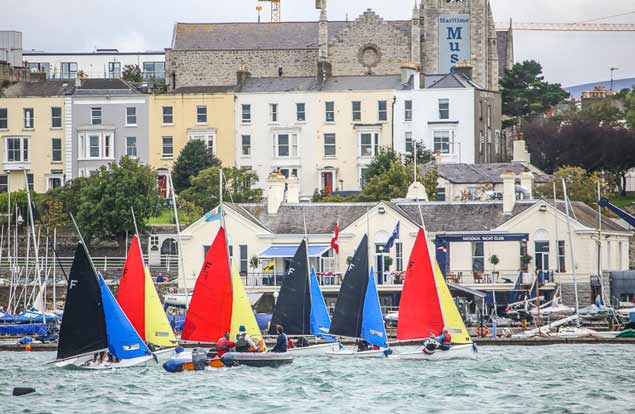 Reefed down Fireflies team racing in front of the National Yacht Club Photo: Afloat.ie
Reefed down Fireflies team racing in front of the National Yacht Club Photo: Afloat.ie
The League built on last month's Elmo Cup momentum at the Royal St. George Yacht Club and bridges the gap to college team racing with young sailors ranging from secondary school to university students participating.
Although the league will be held in Dublin, anyone from around the country is welcome to enter a team regardless of age or ability.
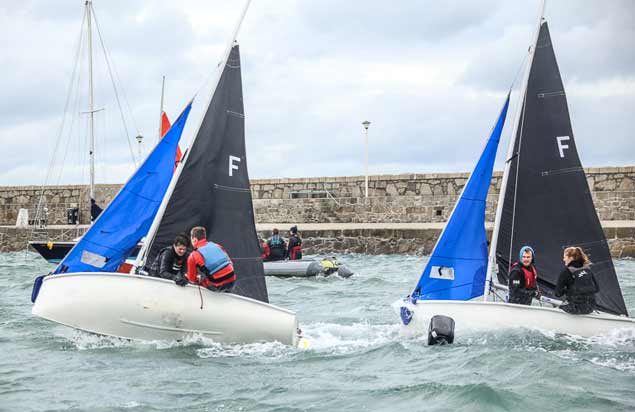 The breeze touched 20–knots for team racing in Dun Laoghaire Harbour Photo: Afloat.ie
The breeze touched 20–knots for team racing in Dun Laoghaire Harbour Photo: Afloat.ie
Dublin Team Racing League Aims to Build on Elmo Cup Momentum
The Dublin University Sailing Club is hosting the first of four Dublin Team Racing League Events in Dun Laoghaire this Saturday, 7th of October. As discussed at the ISA meeting earlier in the year, the goal of the League is to grow team racing in the Leinster region.
Although the league will be held in Dublin, anyone from around the country is welcome to enter a team regardless of age or ability. We are trying to develop sailors, jury and race organisers. These events should be seen as an opportunity for beginners and more advanced team racers to learn.
The League aims to build on last month's Elmo Cup momentum at the Royal St. George Yacht Club and bridge the gap to college team racing.
Teams will be selected to compete in the league on a first come first served basis. Teams can sign up by filling out this google form here.
The number of teams we can accommodate depends on the number of boats we can sail, so if there are fireflies available to use in your club that would benefit the league, please let us know. Any help with this league is greatly appreciated.
The League will run through the winter and should finish up around March/April. As addressed in the meeting earlier in the year, the main issue with team racing is that the majority of racing is done by college sailors who then spend the summers abroad. The idea behind this league is that once it finishes up early next year, the sailors and race organizers that have benefited from racing with us can continue to team race in a summer league. And the league can continue all year round, building year on year.
As the weekend after next is the first Event of the League, we will also be running a team racing talk next Wednesday evening in Trinity College. This talk will be free of charge and prepared and given by some of the sailors from its top team. It is an opportunity for sailors who are not heavily practiced team racers to bring their TR strategy up to speed prior to the first league event (this is also open to anyone who is interested, whether they are racing or not).
More information for the evening, event format, costs, and location will be available in the next couple of days. If you have any immediate questions about the event please contact: Jack Kennedy – [email protected] or Mark Bolger – [email protected]
UCD Sailing Club Get New Team Racing Sails
As the new year of University team racing sailing kicks off, UCD Sailing Club announces it has 'extended its partnership' with sponsors Bank of Ireland so the club sets sails with brand new North sails for its Dun Laoghaire based Firefly dinghies for the next couple of seasons.
Skiff Squad Victorious at Royal St. George's Elmo Team Racing Trophy
Royal Cork Yacht Club's Durcan brothers, Harry and Johnny, along with Atlee Kohl, James McCann and Emily Cullen and Ciara Little from the RStGYC emerged as winners of the third Elmo Team Racing Trophy youth team racing competition, sailed in the RSGYC over the weekend.
Download the overall results below as an Xcel file.
Their edge over the competition was evident, winning all 16 of their races, beating the visiting West Kirby Sailing Club team in the final on Sunday afternoon.
The RSGYC 1 team (Toby Hudson Fowler, Greg Arrowsmith and Henry Higgins) beat their clubmates RSGYC 3 (Helen O'Beirne, Niamh Henry and Morgan Lyttle) to take 3rd overall. A team comprised of Laser 4.7 sailors captained by Tom Higgins won the Silver fleet, with the National Yacht Club winning the Bronze fleet.
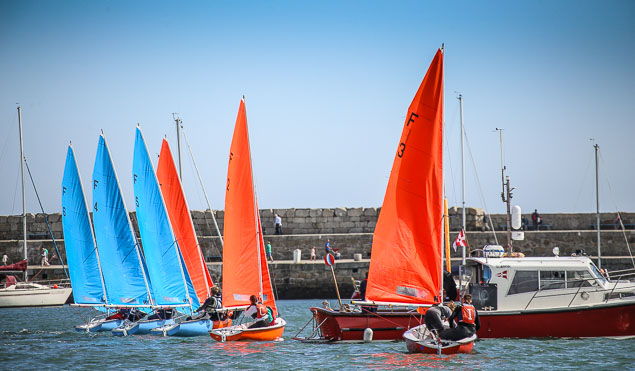 Saturday saw 81 races sailed inside Dun Laoghaire Harbour. Photo: Afloat.ie
Saturday saw 81 races sailed inside Dun Laoghaire Harbour. Photo: Afloat.ie
18 teams took part in the event, with most of the top youth sailors in Ireland competing. Perfect conditions for team racing on Saturday saw 81 races sailed - a credit to the organisers of this growing event. Racing on Sunday morning had to be postponed until the wind died down a little, but race officer Ger Owens successfully managed to get over 30 races sailed in testing conditions. Given the level of interest in the event, and the high standard of racing, the future of team racing in Ireland is looking very bright!
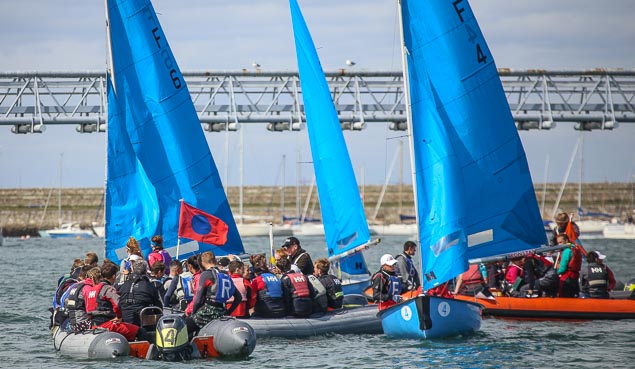 Teams afloat and ready to race in Royal St. George's Firefly fleet
Teams afloat and ready to race in Royal St. George's Firefly fleet
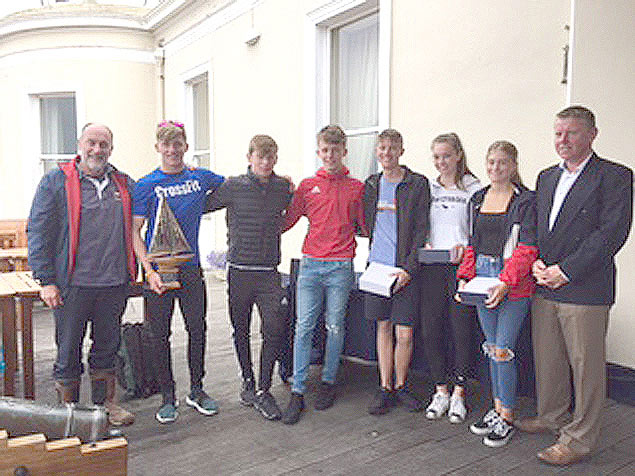 Elmo Trophy winners - 'The Skiff Squad' above, below West Kirby and bottom Team George 1
Elmo Trophy winners - 'The Skiff Squad' above, below West Kirby and bottom Team George 1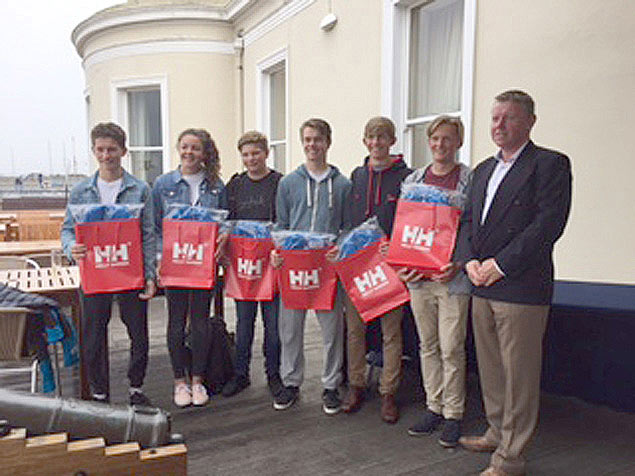
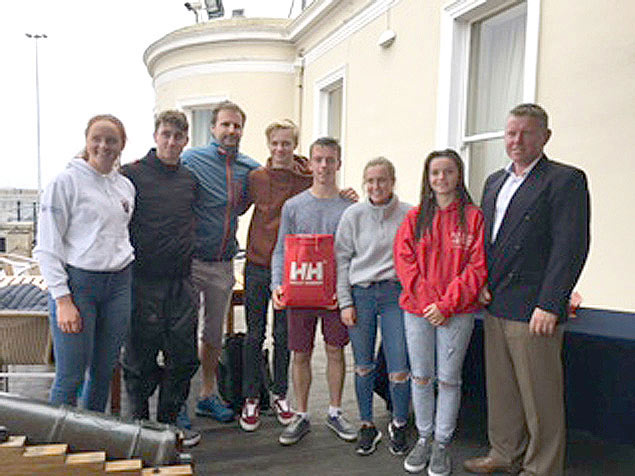
High Profile Team Racing Entries for Royal St. George's Elmo Trophy
This weekend sees a high profile list of competitors taking part in team racing's Elmo Trophy, being held in the Royal St. George Yacht Club in Dun Laoghaire. This is the third year of the junior team racing event, named after the late Graham Elmes, founder of the Irish Team Racing Association.
Reflecting the growth in team racing among our young sailors, there has been huge interest in the event this year.
18 teams from around Ireland and the UK will be competing over two days, with teams of 6 under 18–year–olds sailing in two man firefly dinghys. Indeed, five additional teams had to be turned away as demand was so great to secure places.
The line up includes Laser sailors Johnny Durcan, Ewan McMahon, Luke McGrath, Conor Quinn, Jack Fahy, Sally Bell, Tom Higgins, Henry Higgins, Claire Gorman, Michael O'Sullibhan, 420 sailors Geoff Power, Kate Lyttle and Grace O'Beirne, RS200 sailors Toby Hudson Fowler and Greg Arrowsmith, RS Feva champions Henry Start and Morgan Devine and, of course, 29er sailor Harry Durcan - to name but a few.
Team Racing Clinic At Royal St George YC Next Week
#TeamRacing - The Royal St George Yacht Club next week hosts a clinic in team racing — which is quickly gaining a reputation as Ireland’s most enjoyable and fastest growing type of sailing for teenagers.
Running from Monday 14 to Thursday 17 August, and with some of Ireland’s top youth team racers as coaches, The Royal St George says the clinic promises to be a great week.
The team racing clinic is open to sailors of all experience levels, aged between 13 to 18 years, and will be sailed in the club’s team racing Firefly dinghies.
The cost is €120 for members (€150 for non-members) which includes coaching, use of the club boats and lunch daily. Single days’ coaching is also available for €30 (€37.50 for non-members).
Places have been filling up quickly so act fast of you want to take part. Click HERE for more details.
Irish Optimists Ninth in Team Racing Worlds
After a fine display of Team Racing by the Irish Optimist Team in Thailand, Ireland had a spectacular win over France to finish ninth overall in the Team Racing World Championships 2017.
Things were looking good for Team Ireland when they got into final 16 of the World Championships from 62 countries.
Following three days of fleet racing Ireland was seeded 40th out of 48 teams that qualified for the Team Racing World Championships.
The Irish team comprised Justin Lucas, Harry Twomey, Leah Rickard, Alana Coakley and Charlie Cullen.
After a long day on the water at Royal Varuna Yacht Club, Team Ireland, under Captain Harry Twomey secured a place in the final 16. An amazing achievement, for an Irish Team to qualify for the second round in the Team Racing World Championships.
The Irish Universities Sailing Association (IUSA) Intervarsities is a major team racing event attended by over 160 sailors across 26 teams. This year’s, staged at the hospitable Clifden Boat Club in the far west of Connemara and hosted by University College Dublin, enjoyed good if distinctly crisp weather for the weekend of March 10th to 12th. It saw strong representation from all the major universities and colleges in Ireland, Queens from Northern Ireland, and Loughborough from England, together with Edinburgh and a representative team from the Scottish Universities Sailing Association.
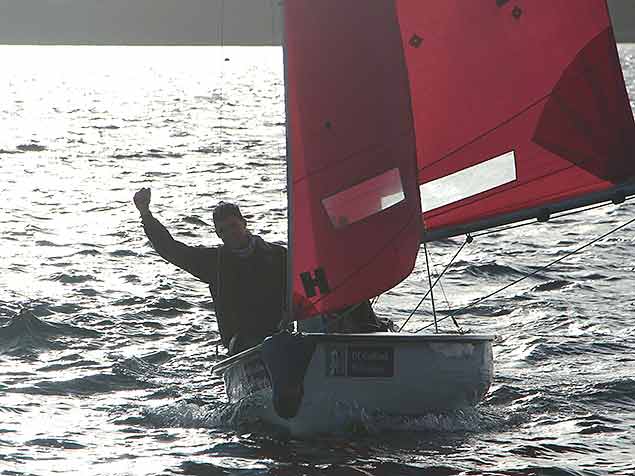 Magic weather at Clifen in Connemara in mid-March, and a magic result for Trinity is celebrated with an air-punch by helmsman Scott Flanigan. Photo: Guy Boggan
Magic weather at Clifen in Connemara in mid-March, and a magic result for Trinity is celebrated with an air-punch by helmsman Scott Flanigan. Photo: Guy Boggan
In competition at this level, merely figuring in the frame at all is quite an achievement. But Dublin University SC – known to all as Trinity – were determined to put an end to an eleven year drought in winning this title. Under the very determined team captaincy of Richard d’Esterre Roberts (who is also a former Captain of the DUSC, and is known to all as Rich Roberts) the Dublin squad got through to the final to find themselves up against University College Cork Team 3.
Roberts being from Cork himself, this added an extra edge, and in a tense final Trinity had worked through to a 2-1 lead when a black flag offence on in the finish line by a Cork boat put Trinity three up. And so Rich Roberts is Sailor of the Month for March, fully supported by his team mates Scott Flanigan, Cara McDowell, Daniel Gill, Kate O’Reilly, and Laragh Lee.
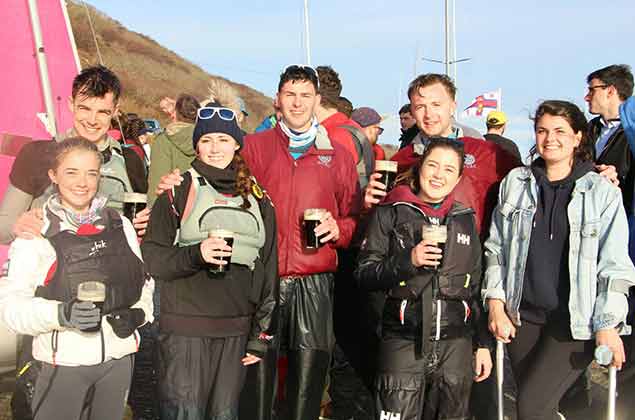 The Trinity team at Clifden Boat Club celebrate ending their eleven year drought at Clifden Boat Club with their captain Rich Roberts on the left. Photo Guy Boggan
The Trinity team at Clifden Boat Club celebrate ending their eleven year drought at Clifden Boat Club with their captain Rich Roberts on the left. Photo Guy Boggan
Leinster Schools Ready For Team Racing Championship at the Royal St. George Yacht Club
The first four teams at this Saturday's Leinster Schools Team Racing Championship on Saturday at the Royal St. George Yacht Club will qualify to compete in the Irish Schools National Championships which will be held in Schull, Cork on April 28th/29th.
Teams are made up of three boats with two students per boat with entries to date coming from Saint Andrews College, Gonzaga College and Loreto College, St. Stephen's Green.
Short, sharp races in Firefly dinghies are 'rolling' all day with multiple races. The focus is on the team as opposed to the winning boat with results of the individual teams boats combining to the teams overall result.
Royal St. George's Ronan Adams says 'Team racing is enjoying a revival in Ireland at the moment with college and university sailing growing along with younger sailors enjoying the alternative racing and team competition of 'team racing' that fosters team thinking and inclusion'.
Trinity Sailing Team Win First IUSA Intervarsities in 11 Years
University College Dublin Sailing Club (UCDSC), the defending Varsities champions, hosted the Irish University Sailing Association (IUSA) Intervarsities out of Clifden Boat Club from the 10th to the 12th March. 26 teams were racing at the final IUSA event of the year representing UCD,Trinity (DUSC), DIT, DCU, UCC, CIT, NUI Galway, Queen's University Belfast, Loughborough, Edinburgh and the Scottish University Sailing Association (SUSA). In total the event was attended by over 160 sailors.
The event kicked off on Thursday with Trinity, three UCC teams and SUSA building early leads. Trinity, two of the UCC teams, and SUSA finished the day unbeaten to carry over their one hundred percent records to the second day of the round robin. After finishing day two with eleven wins from twelve races, Trinity, along with three UCC teams, booked their place in the final day’s Gold Fleet semi-finals.
The third and final day of sailing saw the culmination of the round robin and the division into the Gold, Silver and Bronze Fleets for the knockout stages. Hosts UCD were represented across the fleets with their Fourth team taking victory in the Bronze final. UCC’s Fifth team took the Silver Fleet final while in the best-of-five races Gold Fleet final was contested by Trinity’s Firsts and UCC’s Thirds. After Trinity took a 2-1 lead, a black flag offence by UCC boat on the finish line meant that Trinity team of Scott Flanigan, Cara McDowell, Daniel Gill, Kate O’Reilly, Richard Roberts, and Laragh Lee returned to shore as 2017 Varsities champions.
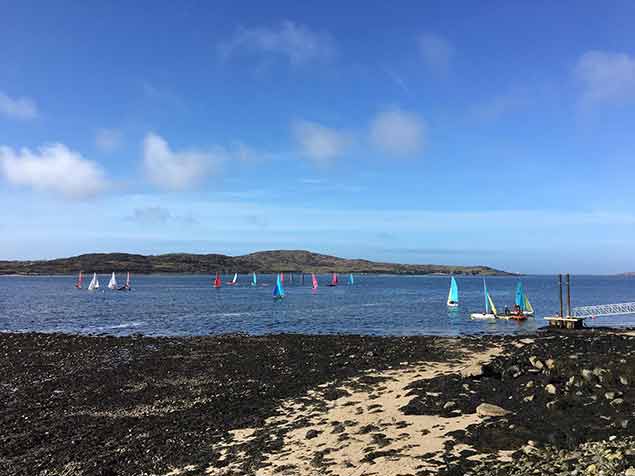 The Colleges go afloat in Clifden for the 2017 IUSA Intervarsities
The Colleges go afloat in Clifden for the 2017 IUSA Intervarsities
Trinity club captain Daniel Gill said “it's the best week of results in recent history for Trinity Sailing and the first time we have won varsities in eleven years. Results have been consistently strong at all the regional events this year and the changing of helms and crews throughout shows how strong the club is at the moment, particularly given that many of them are sailing on our seconds, thirds and fourths, showing the depth we have in the club."
The culmination of such a well-run event resulted in UCDSC being awarded IUSA Event of the Year at the final evening’s awards ball, where UCC’s Florence Lyden was awarded Fresher of the Year with Brendan Lyden, also of UCC, awarded Sailor of the Year.
The IUSA AGM also took place during Varsities, with UCC’s Paddy Hogan elected as the incoming Treasurer/Secretary and Trinity’s Chris Phelan elected as President.
The 2017 Colours Match between Trinity and UCD will take place on April 1st in Grand Canal Dock and the Student Yachting Nationals will be held at the end of April, doubling as the qualifiers for the Student Yachting World Cup (SYWoC) and marking the official end of the student sailing season for 2016/17.


























